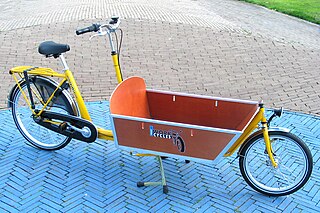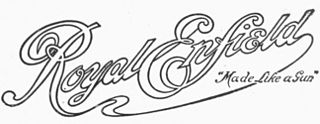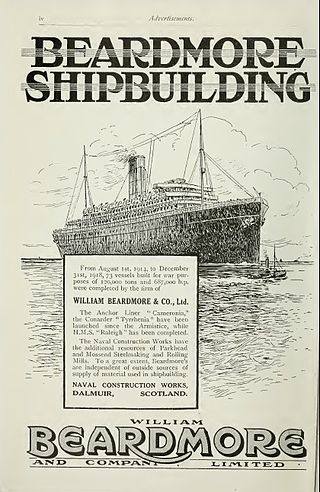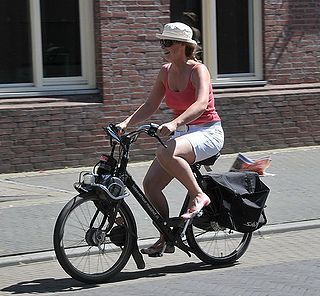
The Birmingham Small Arms Company Limited (BSA) was a major British industrial combine, a group of businesses manufacturing military and sporting firearms; bicycles; motorcycles; cars; buses and bodies; steel; iron castings; hand, power, and machine tools; coal cleaning and handling plants; sintered metals; and hard chrome process.

Jowett was a manufacturer of light cars and light commercial vehicles in Bradford, West Riding of Yorkshire, England from 1906 to 1954.

Pashley Cycles is a British bicycle, tricycle and workbike manufacturer based in Stratford-upon-Avon in Warwickshire, England. The company was started in 1926 and still manufactures bikes in the UK.

The Rover Company Limited was a British car manufacturing company originally founded in 1878, beginning car manufacturing in 1904. It primarily operated from its base in Solihull, Warwickshire. Rover also manufactured the Land Rover series from 1948 onwards, and created the Range Rover in 1970, which went on to become its most successful and profitable product. Land Rover eventually became a separate company and brand in its own right.

There have been many human powered vehicles designed and constructed specifically for transporting loads since their earliest appearance in the 20th century. They are referred to variously depending on the number of wheels — typically two, three, or four — and by their specific use. Adjectives used to describe the tasks to which the bicycles, dicycles, tricycles, or quadracycles are put include cargo cycles, freight cycles, box cycles, carrier cycles, and so on. Sometimes they are also called cycletrucks, which uses a sense of the word 'truck' predating the automobile.

James Starley was an English inventor and father of the bicycle industry. He was one of the most innovative and successful builders of bicycles and tricycles. His inventions include the differential gear, the perfection of the bicycle chain drive, and the penny-farthing.

A milk float is a vehicle specifically designed for the delivery of fresh milk. Today, milk floats are usually battery electric vehicles (BEV), but they were formerly horse-drawn floats. They were once common in many European countries, particularly the United Kingdom, and were operated by local dairies. However, in recent years, as the number of supermarkets, small independent grocers and petrol stations, and convenience stores stocking fresh milk has increased, many people have switched from regular home delivery to obtaining fresh milk from these other sources.

Delivery is the process of transporting goods from a source location to a predefined destination. Cargo is primarily delivered via roads and railroads on land, shipping lanes on the sea, and airline networks in the air. Certain types of goods may be delivered via specialized networks, such as pipelines for liquid goods, power grids for electrical power and computer networks such as the Internet or broadcast networks for electronic information. Car transport is a particular subgroup; a related variant is Autorack, which involves the transport of autos by railroads.

Royal Enfield was a brand name under which The Enfield Cycle Company Limited of Redditch, Worcestershire, England, sold motorcycles, bicycles, lawnmowers and stationary engines which it manufactured. Enfield Cycle Company also used the brand name "Enfield" without the "Royal".
Birmingham is one of England's principal industrial centres and has a history of industrial and scientific innovation. It was once known as 'city of a thousand trades' and in 1791, Arthur Young described Birmingham as "the first manufacturing town in the world". Right up until the mid-19th century Birmingham was regarded as the prime industrial urban town in Britain and perhaps the world, the town's rivals were more specific in their trade bases. Mills and foundries across the world were helped along by the advances in steam power and engineering that were taking place in the city. The town offered a vast array of industries and was the world's leading manufacturer of metal ware, although this was by no means the only trade flourishing in the town.

Sunbeam Cycles made by John Marston Limited of Wolverhampton was a British brand of bicycles and, from 1912 to 1956 motorcycles.
Lucas Industries plc was a Birmingham-based British manufacturer of motor industry and aerospace industry components. Once prominent, it was listed on the London Stock Exchange and was formerly a constituent of the FTSE 100 Index. In August 1996, Lucas merged with the American Varity Corporation to form LucasVarity.

Matchless is one of the oldest marques of British motorcycles, manufactured in Plumstead, London, between 1899 and 1966. A wide range of models were produced under the Matchless name, ranging from small two-strokes to 750 cc four-stroke twins. Matchless had a long history of racing success; a Matchless ridden by Charlie Collier won the first single-cylinder race in the first Isle of Man TT in 1907.

William Beardmore and Company was a British engineering and shipbuilding conglomerate based in Glasgow and the surrounding Clydeside area. It was active from 1886 to the mid-1930s and at its peak employed about 40,000 people. It was founded and owned by William Beardmore, later Lord Invernairn, after whom the Beardmore Glacier was named.

A motorized bicycle is a bicycle with an attached motor or engine and transmission used either to power the vehicle unassisted, or to assist with pedalling. Since it sometimes retains both pedals and a discrete connected drive for rider-powered propulsion, the motorized bicycle is in technical terms a true bicycle, albeit a power-assisted one. Typically they are incapable of speeds above 52 km/h (32 mph); however, in recent years larger motors have been built, allowing bikes to reach speeds of upwards of 113 km/h.

Chater-Lea was a British bicycle, car and motorcycle maker with a purpose-built five-storey factory in Banner Street, EC1, in the City of London and, from 1928, premises at Letchworth, Hertfordshire. It was founded by William Chater-Lea in 1890 to make bicycle frames and components. It made cars between 1907 and 1922 and motorcycles from 1903 to 1935. William died in 1927 and the business was taken over by his sons John and Bernard. After vehicle production finished, the company remained trading as a bicycle component maker and contract manufacturer until 1987. The company relaunched in 2017 as a maker of high-end British manufactured bicycle components and launched its first new products in the summer of 2019.
CCM is a Canadian bicycle brand owned by Canadian Tire. The brand was first used by the Canada Cycle & Motor Co. Ltd, founded in Weston, Ontario in 1899. CCM dominated the Canadian bike market for much of the 20th century before becoming bankrupt in 1983. The CCM trademark was then acquired by Procycle Group, while the company's hockey assets were sold off.
The Raleigh Bicycle Company is a British bicycle manufacturer based in Nottingham, England and founded by Woodhead and Angois in 1885. Using Raleigh as their brand name, it is one of the oldest bicycle companies in the world. After being acquired by Frank Bowden in December 1888, it became The Raleigh Cycle Company, which was registered as a limited liability company in January 1889. By 1913, it was the largest bicycle manufacturing company in the world. From 1921 to 1935, Raleigh also produced motorcycles and three-wheel cars, leading to the formation of Reliant Motors. Raleigh bicycle is now a division of the Dutch corporation Accell.

Worksman Cycles is a family-owned American manufacturer of bicycles and tricycles for industrial, commercial and recreational use. The company was founded in 1898 and is headquartered in Ozone Park in the borough of Queens in New York City. Previously in the Spear Building the company also operates an additional factory in Conway, South Carolina. Worksman is the oldest bicycle manufacturer in the United States and has operated its own factory-direct e-commerce store since 2004.

Gustave Adolphe Clément, known from 1909 Clément-Bayard, was a French entrepreneur. Despite being orphaned, he became a blacksmith and a Compagnon du Tour de France. He later ventured into racing and manufacturing bicycles, pneumatic tyres, motorcycles, automobiles, aeroplanes and airships.















